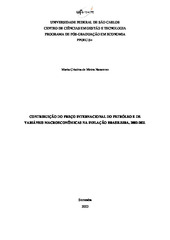Contribuição do preço internacional do petróleo e de variáveis macroeconômicas na inflação brasileira, 2002-2021
Abstract
Inflation can be affected by several transmission mechanisms, which can change over time. The world's productive matrix has oil as the predominant primary energy source, thus, fluctuations in its price impact the economic activity of any country and the formation of prices in the domestic market, directly or indirectly affecting other variables related to trade, such as interest rate and exchange rate. In addition, the characteristics of the Brazilian oil and gas sector stand out, due to the position of the Government of Brazil
as the majority shareholder of Petrobras. Starting in the beginning of the 2010s, Petrobras adopted oil pricing detached from the international market to control inflation, a scenario that changed from 2016, with the adoption of the import parity price (IPP) mechanism. Therefore, the objective of this work is to measure and analyze how shocks in international oil prices, interest rates and exchange rates have influenced Brazilian inflation over the period from 2002 to 2021. For this, two econometric approaches were used through the estimation of a Vector Error Correction Model (VEC): (i) the modeling proposed by Houck (1977), to test the hypothesis of asymmetric price transmission, and (ii) the estimate of spillover indices, to test the connectivity between variables. It was verified that all variables present asymmetric transmission to Brazilian inflation – with oil and exchange rate increases being passed on with greater intensity, while for interest rate the transmission of decreases were more intense. Regarding market connectivity, decreases in oil and interest rates transmit more information than increases, while exchange rate was a net transmitter of information for both increases and decreases. Finally, two periods with structural breaks were identified: September 2008 and December 2015.
Collections
The following license files are associated with this item:

